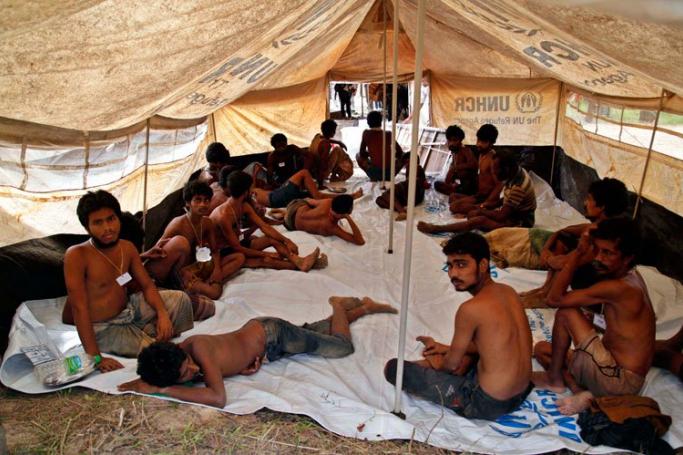More than 700 people rescued from a boat in Myanmar waters last month are still being held in the western state of Rakhine. Authorities verifying their citizenship claim most of them are from both neighbouring Bangladesh, while the rest are Rohingyas according to a report by Channel News Asia on 17 June.
At the shelter housing the rescued migrants Ya Ya Khant is known as number 173 to the authorities, but to his family, he's a lost son.
The Myanmar Navy rescued him, together with these other migrants on their way to hopefully find employment in countries like Malaysia and Indonesia. The 25-year-old had been living in an Internally Displaced Persons (IDP) camp in Rakhine and desperately wanted to make a better life for himself.
“We are not fine. There are no jobs at the refugee camps. That's why we left for Malaysia,” he said. “Dead or alive, we are leaving for Malaysia, because we have no job. We know we have to work six months for US$2,000 (to pay off the broker). We are then able to send the money to our family after six months. That's why we are leaving.”
The Myanmar government recently repatriated 150 people to Bangladesh. The remaining 700 would-be migrants housed in a temporary shelter will be next in line.
Ya Ya Khant’s hopes of starting a new life have been shattered, all he wants right now is to return to the IDP camp and let his family know that he's alive and well. The Myanmar government maintains that Ya Ya Khant, and other migrants like him, leave for economic reasons and not because they are persecuted.
"Even though we try to stop the smuggling and trafficking, they are still leaving of their free will through their own connections,” said Rakhine Chief Minister Maung Maung Ohn. “It does not make sense that the boat people are fleeing from the camps because Myanmar is torturing them. We might have our weak points but that doesn't cause them to flee.”
Some left because they wanted to find a job in a different country, some left because they were tricked into doing so. Others could no longer bear the life filled with restrictions. However, one thing remains clear. Many of them remain extremely worried today, and that is because their future ahead lies with greater uncertainty.
For now, many of them take comfort in the knowledge that they are no longer drifting aimlessly at sea. And even though regional governments have addressed the migrant issue temporarily, a long term solution is yet to be found.
You are viewing the old site.
Please update your bookmark to https://eng.mizzima.com.
Mizzima Weekly Magazine Issue...
14 December 2023
New UK Burma sanctions welcome...
13 December 2023
Spring Revolution Daily News f...
13 December 2023
Spring Revolution Daily News f...
12 December 2023
Spring Revolution Daily News f...
11 December 2023
Spring Revolution Daily News f...
08 December 2023
Spring Revolution Daily News f...
07 December 2023
Diaspora journalists increasin...
07 December 2023
Mizzima interview with Mr Adriano Campolina, Chief Executive, Action Aid International












